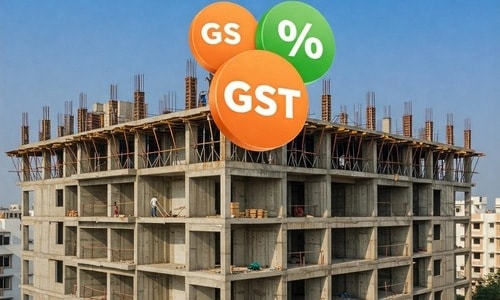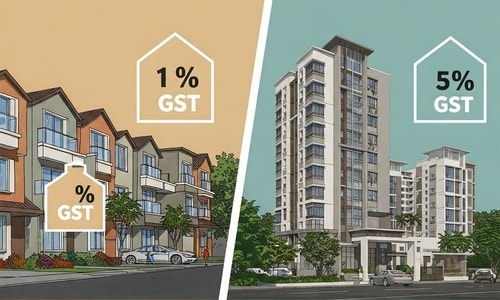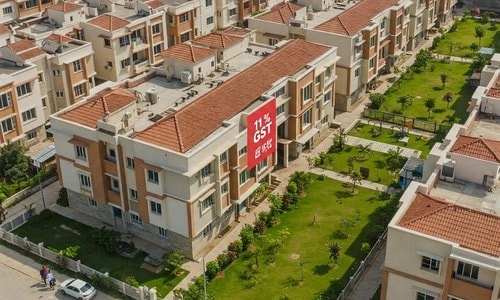
GST on Flat Purchase: Understanding Its Impact on Home Buyers
By Kolte-Patil Team | Last Updated: August 6, 2025
Buying a home is one of the most significant investments in a person’s life. Property tax is one of the financial considerations homebuyers must account for when purchasing a property. Understanding the Goods and Services Tax (GST) implications on property purchases is crucial for homebuyers. Before GST, buyers had to pay multiple taxes such as VAT, stamp duty, and service tax, whereas now they only need to pay taxes like GST on under-construction properties. Let’s explore how GST affects residential property purchases and debunk common misconceptions.

Introduction to GST
The Goods and Services Tax (GST) is a value-added tax levied on the supply of goods and services in India. Introduced by the Indian government, GST replaced multiple indirect taxes such as service tax, excise duty, and value-added tax (VAT). This unified tax system aims to simplify the tax structure and bring transparency to various sectors, including real estate. For home buyers, understanding GST rates, calculation methods, and guidelines is crucial for making informed property purchases. The GST regime has evolved over time, and staying updated on the latest developments can help avoid unexpected costs and complications.
GST on Residential Property Purchase

The introduction of GST has simplified the tax structure in India, but it also brought changes to the real estate sector. Here’s a breakdown of GST on residential property purchases:
- Under-Construction Property: GST is applicable at 5% without the benefit of Input Tax Credit (ITC).
- Completed and Ready-to-Move-In Property: No GST is charged as these do not fall under the definition of a ‘goods’ transaction.
Additionally, registration fees are affected by changes in taxation rates, which remain a relevant cost for homebuyers.
GST charges on residential property purchases can vary based on factors such as property type and location. The GST Council plays a crucial role in determining GST rates for property purchases, influencing tax policies and rates.
Understanding these distinctions can help homebuyers plan their investments better. Notably, resale flats are not subject to GST, simplifying the transaction process.
Types of Properties Affected by GST

GST applies primarily to under-construction properties, including flats, apartments, and buildings. Ready-to-move-in properties or those with a completion certificate are exempt from GST. The applicable GST rate varies based on the type of property:
- Affordable Housing Projects: Attract a lower GST rate of 1%.
- Non-Affordable Housing Projects: Attract a higher GST rate of 5%.
The stage of construction also influences the GST rate, with under-construction properties generally attracting higher rates than completed ones. Home buyers should be well-versed in these distinctions to avoid confusion and ensure accurate GST calculations.
Impact of GST on Residential Property Purchase

GST has both positive and negative impacts on the real estate market:
- Transparency and Accountability: GST has streamlined the tax structure, reducing the cascading effect of multiple taxes. Government housing schemes like Pradhan Mantri Awas Yojana have also benefited from reduced GST rates, making affordable housing more accessible.
- Cost Implications: While GST is expected to reduce the overall tax burden in the long run, it initially increases the cost for under-construction properties due to the 5% tax rate, impacting the tax liability for developers and buyers.
GST on Affordable Housing

Affordable housing projects benefit from a reduced GST rate of 1%, making them more accessible to a broader range of home buyers. This lower rate is part of the Indian government’s efforts to promote affordable housing through initiatives like the Pradhan Mantri Awas Yojana. When purchasing a property, home buyers should verify if it qualifies as affordable housing to benefit from the lower GST rate. Additionally, the GST on affordable housing is calculated based on the transaction value, and buyers should ensure they receive the input tax credit (ITC) benefit from the developer, which can further reduce the overall cost.
Conditions Governing GST on Residential Real Estate
Certain conditions dictate the application of GST on residential real estate:
- Type of Property: GST is applicable only on under-construction properties, not on completed or ready-to-move-in properties.
- Affordable Housing: For affordable housing projects, GST is charged at a reduced rate of 1%.
Maintenance Charges and GST: Maintenance fees for flats are subject to GST, and these charges are not exempt from taxes. This can significantly impact homebuyers’ financial considerations, as the specifics of GST application depend on the amount contributed to housing societies.
Proper documentation, including a tax invoice, is essential for claiming Input Tax Credit (ITC) under the GST regime. This can significantly impact the overall cost of purchasing under-construction properties.
Maintenance Charges and GST
GST also applies to maintenance charges for flats, covering the cost of upkeep and services. The applicability of GST on maintenance charges depends on the amount:
- Maintenance Charge ≤ Rs 7,500: GST is not applicable.
- Maintenance Charge > Rs 7,500: GST is applied to the entire amount, not just the excess over Rs 7,500.
Home buyers should be aware of these thresholds to avoid overpaying GST on maintenance charges. The GST on maintenance charges is calculated based on the transaction value, and buyers should ensure they receive the input tax credit (ITC) benefit from their housing society, which can help offset some of the costs.
Common Misconceptions About GST on Residential Property Purchase
- GST on Property Purchases is Calculated Similarly to Any Other GST Implementation:
- Reality: The calculation of GST on property is specific to the real estate sector, with distinct rates and conditions. Before the implementation of GST, various taxes such as VAT and service tax were applicable, which added to the complexity of property transactions.
- GST is Applicable on Land Purchases:
- Reality: GST is not applicable on land purchases, only on the construction part of the property. The GST system has streamlined the taxation process for property purchases, making it clearer that land sales are exempt from GST, while under-construction flats are subject to specific tax rates and conditions, including the concept of Input Tax Credit (ITC).
- Affordable Housing Projects Offer Better GST Rates:
- Reality: Yes, affordable housing projects attract a lower GST rate of 1%, making them more attractive to budget-conscious buyers.
What is the GST on Property in India?
The GST rate on under-construction properties is 5%, and for affordable housing, it is 1%. Understanding these tax rates is crucial for buyers and developers to avoid penalties during property transactions. No GST is applicable on ready-to-move-in properties.
The gst law, which includes the concept of Input Tax Credit (ITC), significantly differentiates the GST framework from India’s previous tax systems. ITC allows businesses to recover taxes paid on inputs, reducing their overall tax liability when selling goods or services.
Frequently Asked Questions
1. Is Real Estate Subject to GST?
- Yes, but only under-construction properties are subject to GST.
2. How to Avoid GST on Flat Purchases?
- Buy ready-to-move-in properties where GST is not applicable. Paying GST is required for under-construction properties, but completed flats are exempt.
3. What is the GST on Commercial Property?
- The GST on commercial properties is 12%.
4. How to Calculate GST on a Flat in 2024?
- The calculation involves 5% of the total purchase price for under-construction properties.
5. How to Avoid GST on an Under-Construction Property?
- Purchase completed or ready-to-move-in properties to avoid GST.
6. What is the New GST Rule on Property Purchases?
- The latest rules on GST on real estate maintain GST at 5% for under-construction properties and 1% for affordable housing without ITC. These rules impact homebuyers and developers by simplifying the tax structure and clarifying the applicable rates.
7. Who Pays GST, the Builder or the Buyer?
- The buyer pays GST as part of the total purchase price.
8. How Do I Claim a GST Refund on a Flat?
- GST refunds can typically be claimed for commercial properties, not residential.
9. What is 12% GST on Property Purchases?
- The 12% GST rate applies to commercial properties, not residential ones.
Conclusion
Understanding GST implications is crucial for homebuyers to make informed decisions. Before taking any step, it’s beneficial to learn about trusted developers like Kolte-Patil Developers, whose storied journey ensures transparency and clarity in all transactions, helping you make the right decisions. Kolte Patil Developers ensure transparency and clarity in all transactions, helping you make the right decisions best real estate investments. Whether you are looking to or explore pre-launch properties, knowing your GST obligations can save you from unexpected costs. For expert assistance, contact Kolte Patil Developers today.




